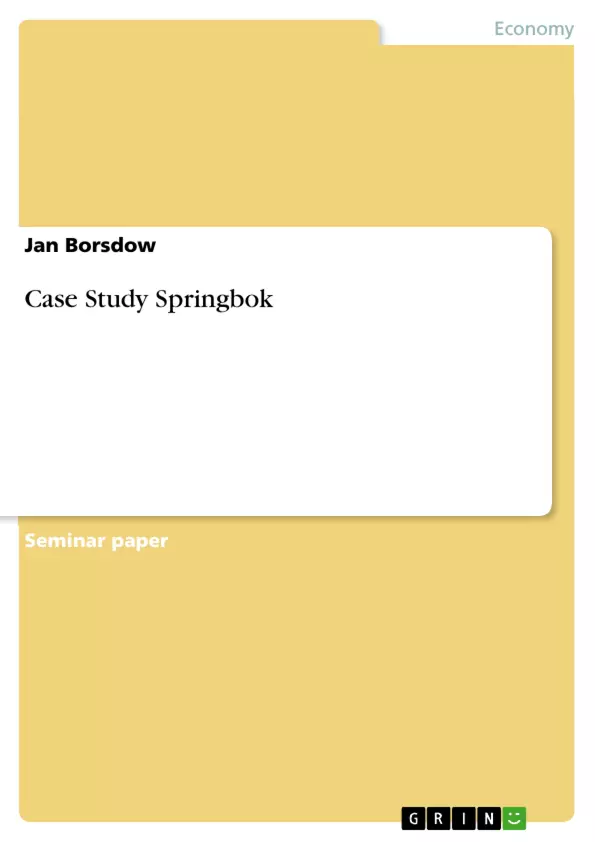Springbok Group is a South African based grocery retailer looking to invest in the Australian grocery industry. The organization has invested in the Australian market through the acquisition of the floundering retailer, Clinton’s. Clinton’s have been forced to sell their Australian market share due to non-profitability and impending bankruptcy, a result of the incompatibility of the company’s existing strategy and the Australian market. Springbok Group believes that there is potential in the Australian market, as groceries represent 10% of the total GDP (AU$158.4 billion of the Australian economy). In order to tap into this market careful planning of the firm’s strategy must be carried out. Strategy is exclusively concerned with specific competitive advantage, and for Springbok to avoid the mistakes of their predecessors they will need to implement a strategy allowing more efficient operation in the environment and define unique competencies. The following is a strategy designed to ensure a sustainable position for Springbok’s in the Australian grocery market.
Inhaltsverzeichnis (Table of Contents)
- EXECUTIVE SUMMARY.
- CASE STUDY
- INTRODUCTION.
- ISSUE WITH THE STRATEGY AND FOCUS OF CLINTON'S
- SPRINGBOK'S KEY POTENTIAL STRATEGIC RESPONSES
- Key Strategy 1: Minimise High Competition...
- Key Strategy 2: Efficient Internal and External Processes.
- Key Strategy 3: Expand Target Market..
- SPRINGBOK'S SHORT TERM ACTIONS.
- Marketing
- Accessibility..
- Management....
- Competitive Advantage...
- SPRINGBOK'S LONG-TERM AUSTRALIAN STRATEGY
- Positioning
- Growth..
- RECOMMENDATIONS.
- APPENDIX
- A. SWOT & DYNAMIC SWOT
- B. VRIE
- C. PEST ANALYSIS.
- D. INDUSTRY ANALYSIS
- E. GROWTH TRENDS
- F. GAP ANALYSIS..
- G. FORMULATING A STRATEGY
- H. THE GROWTH....
- I. QUALITATIVE COST ANALYSIS.
- J. STRATEGIC TREE
- K. GANTT CHART.
- REFERENCES..
Zielsetzung und Themenschwerpunkte (Objectives and Key Themes)
This case study aims to analyze the strategic position of Springbok Group, a South African grocery retailer, as they enter the Australian market through the acquisition of Clinton's, a floundering retailer. The analysis delves into the previous strategy of Clinton's, identifies internal strengths and weaknesses, analyzes external opportunities and threats, discovers gaps in the existing strategy, and provides recommendations for addressing these factors to ensure a sustainable market position for Springbok Group. This work focuses on providing a strategic roadmap for Springbok Group to avoid the mistakes of Clinton's and establish a successful presence in the Australian grocery market.
- Analyzing the strategic weaknesses of Clinton's previous approach.
- Identifying opportunities and threats present in the Australian grocery market.
- Developing strategic recommendations for Springbok Group to achieve a sustainable competitive advantage.
- Evaluating the effectiveness of implementing short-term and long-term strategic actions.
- Assessing the impact of internal and external factors on Springbok Group's success in the Australian market.
Zusammenfassung der Kapitel (Chapter Summaries)
The case study begins with an introduction to Springbok Group and their acquisition of Clinton's in the Australian grocery market. The study emphasizes the need for a sound strategy to avoid past mistakes and achieve success in this competitive environment. The analysis then delves into the issues with Clinton's existing strategy, highlighting its internal focus, limited target market, and lack of specific competencies. The external threats facing Springbok Group are also addressed, including high competition, potential price wars, and the possibility of new entrants. The study then outlines key potential strategic responses for Springbok Group, suggesting strategies for minimizing competition, improving internal and external processes, and expanding their target market. The analysis also proposes short-term actions focused on marketing, accessibility, management, and competitive advantage. The final section focuses on Springbok Group's long-term strategy for the Australian market, including positioning and growth plans.
Schlüsselwörter (Keywords)
This case study explores strategic management within the context of a South African grocery retailer entering the Australian market. Key areas of focus include internal and external analysis, competitive advantage, market entry strategies, short-term and long-term action plans, and the development of a sustainable business model. The study utilizes frameworks such as SWOT analysis, PEST analysis, and Porter's Five Forces to guide its assessment of the strategic landscape.
Frequently Asked Questions
What is the Springbok Group's strategy for the Australian market?
Springbok aims to achieve a sustainable competitive advantage by acquiring Clinton's and implementing more efficient internal processes and a broader target market.
Why did Clinton's fail in the Australian grocery industry?
Clinton's failed due to an incompatible strategy, non-profitability, and a lack of unique competencies to survive high competition.
How significant is the grocery market in Australia?
The grocery sector represents approximately 10% of Australia's total GDP, valued at around AU$158.4 billion.
What are the short-term actions recommended for Springbok?
Recommended actions include improving marketing, enhancing accessibility, optimizing management, and defining a clear competitive advantage.
Which analytical frameworks are used in this case study?
The study utilizes SWOT, PEST, VRIE, and Gap analyses to assess the market and formulate a robust long-term strategy.
- Quote paper
- Jan Borsdow (Author), 2006, Case Study Springbok, Munich, GRIN Verlag, https://www.grin.com/document/70928



